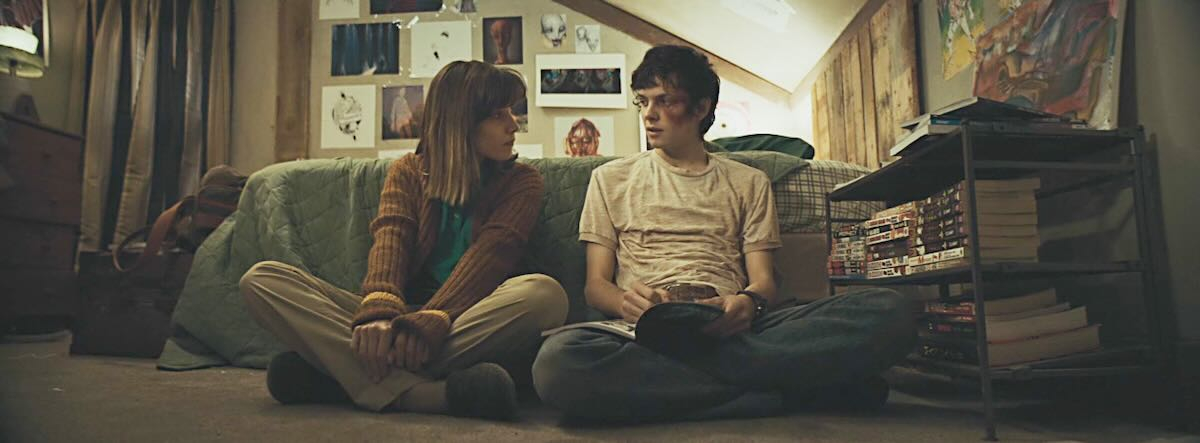
The new film The Mental State opens at a revival meeting -- slick preacher, "praise be"s -- during which the virtues of an upcoming healing retreat are extolled. But the film isn't about that.
During a pivotal house party scene, a Confederate flag hangs languidly on a porch. Yet the film isn't about that, either.
The climax comes in a high school with students terrorized by a gunman. But that's not really what The Mental State is about, either.
These are merely dollops of exposition, window dressing for a diorama. The business of the movie lies elsewhere.
Andy is a misfit at a rural Kentucky high school, a loner who'd rather work on his graphic novel than put himself out socially. During a weekend jamboree, he's tasked with driving a hayride truck. He finally gets to meet his crush, Bethany, who's supervising the young riders. As Andy steers through the fields, a shot rings out. He manages to drive the kids to safety, but not before spotting -- and recognizing --the shooter.
Andy lives with his mom Angela and her ne'er-do-well boyfriend, who, as Andy points out, "followed you home from a bar one night and never left." Andy periodically goes into the woods to visit his father, who's perched on an abandoned water tower, where he nurses an arsenal and a sour worldview. "This whole town’s going to shit. Once the coal mines closed down, it became the home to mediocrity," he says, after which we have a montage of lives wasted by poverty and pills. Dad's solution: paramilitary action.
But that's not really what the movie's about.
The Mental State is ostensibly about Andy's "mental illness crisis," and claims to be cautionary, implying that we are all Andy, or could be. So what the movie is is a serviceable little thriller about a unique individual and his dubious grip on reality.
The film is based on a play by the same name by Josh Adell, whose work seems honestly aimed at addressing the pressures experienced by today's youth. The action takes place in one room. It shifts narrative power from Andy's psychosis to mom Angela's struggle with addiction while dealing with her son. The Mental State, as a play, is performed regularly in high schools.
In the film directed by James Camali, who cowrote with Jeremy Anderson and Joshua Barclay, the scenario is "opened up": what started as an intimate stage drama now casts a wider net. Andy's psyche is expressed by his actions, which take us into the community.
The filmmakers invite comparison to A Beautiful Mind, Donnie Darko, and Elephant. But it most recalls M. Night Shyamalan's Unbreakable, given the comic book fascination (Andy's is little more than a series of figure sketches), and the hoodied vigilante out to -- to do what? Protect? Save? If we read scenes at face value, Andy is less a savior than a voyeur, positioning himself at one point to watch the person of his affection have sex with someone else.
All this said, The Mental State is a well-made motion picture. Mr. Camali's direction is assured and consistent. Ronnee Swenton's cinematography is suitably dour, all earth tones, bare trees, bleak sky, potholed streets.
The actors throw themselves into their parts: Jance Enslin as Andy draws us in with his haunted eyes while appearing capable of anything; Carly Pope plays the hell out of Angela, mama bear defending her son with meager resources while trying to work within the system; Alyssa Sutherland as Andy's law enforcement aunt Dana grounds us, a steady presence; Alison Thornton is convincingly conflicted as Bethany, the apple of Andy's crazed eye. These are all actors you may have seen but of whom you'll see more. Familiar faces include Jim True-Frost (HBO's The Wire and Boardwalk Empire) as Pastor Shane and Bryan Greenberg (HBO's How to Make It in America) as Dad.
But The Mental State supports my observations about regional filmmaking. With the ease of digital filmmaking and streaming, movies come from everywhere, every milieu. A milieu isn't just a setting; it is a social context. It comes coded, carrying an implicit message, especially in this day and age. You can't "open up" a play like The Mental State as a movie -- or poke at religious fundamentalism, preserving the Confederacy, school shootings, stockpiled weapons, the choice between fentanyl abuse or JROTC (to fight in foreign wars or storm the Capitol?) -- without making a statement. It's disingenuous to suggest that all you’re performing is a public service.
So we have to ask: what would be the best case scenario in a film like The Mental State? What if Angela is successful at "saving" her son Andy? If we make him "normal," what can we hope for him? A steady job with a living wage, marriage, a family? A meaningful life in Sh*thole, Kentucky?
On its surface, The Mental State is a good film. If you watch it, you will have seen something. These are all good filmmakers. In the future, they should get out more.
The Mental State. Directed by James Camali, based the play by Josh Adell. 2022. Released by Gravitas Ventures. Available on TOD and digital platforms. 106 minutes.
